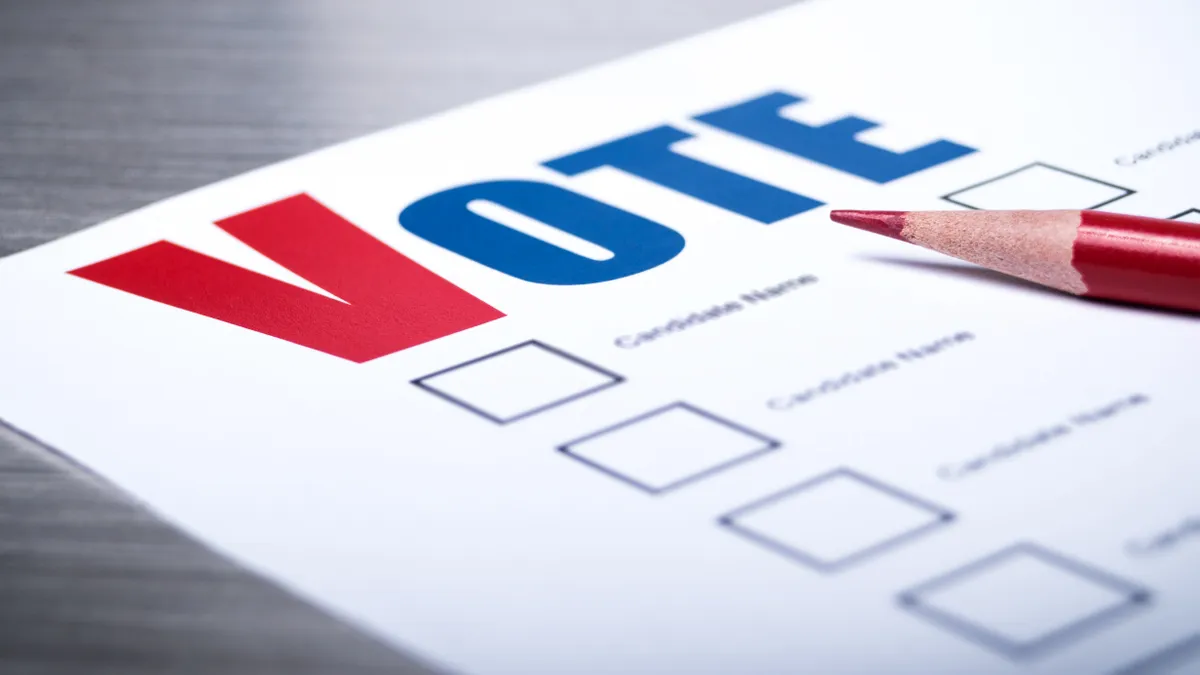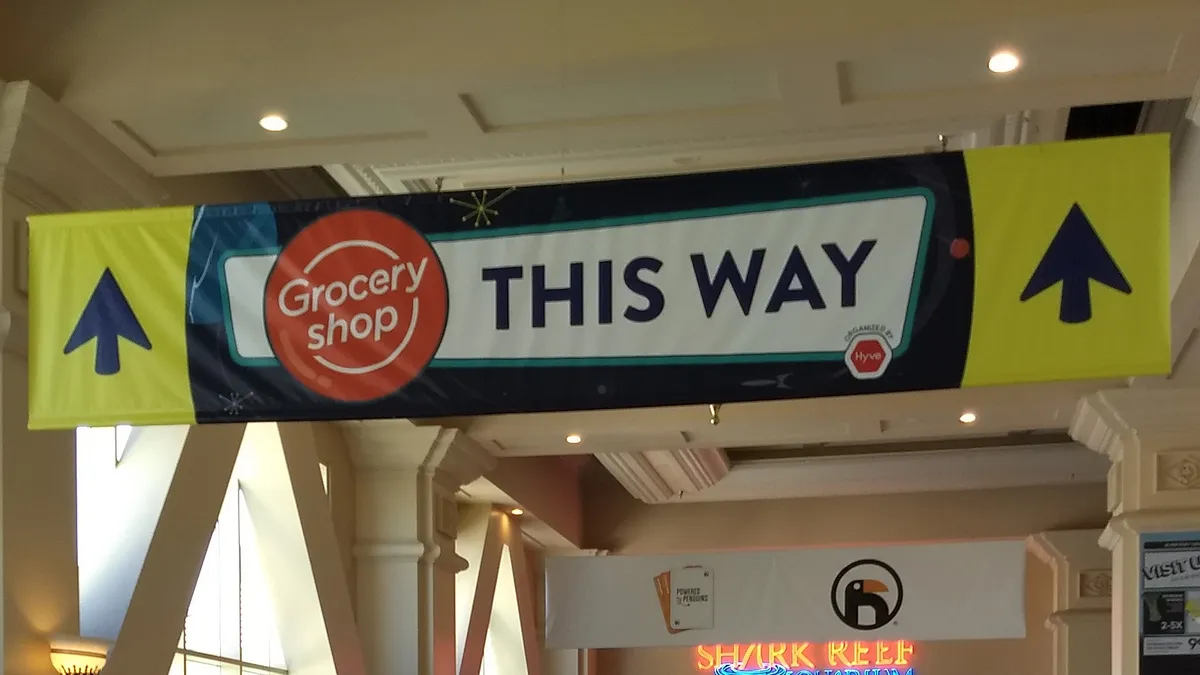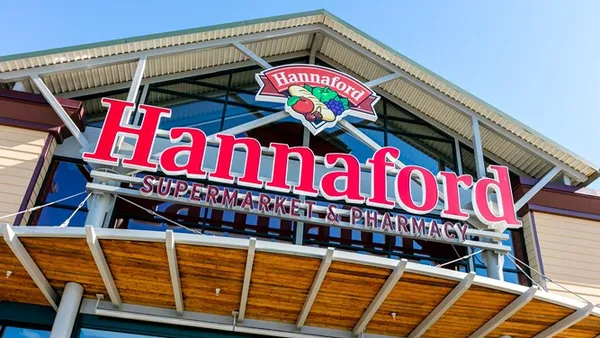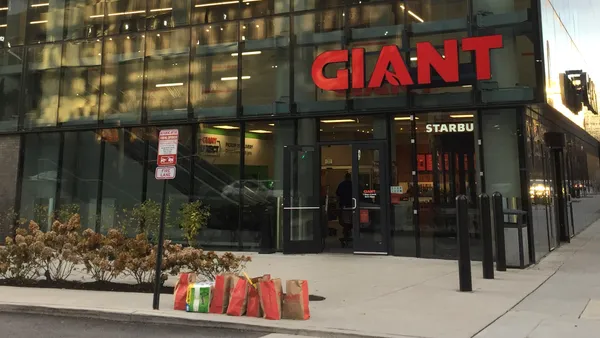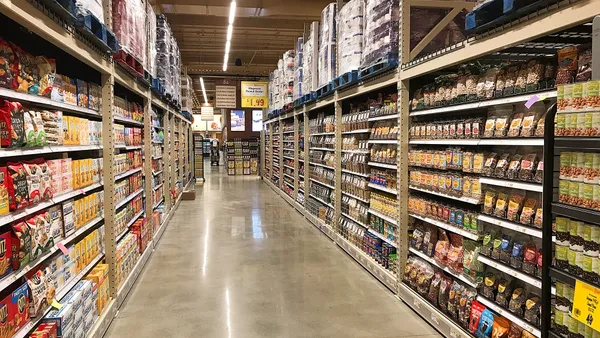The results of three measures in the midterm elections could be the start of a movement for food policy change across the country.
From taxes on grocery sales to a measure regulating the amount of space farm animals get in cages and crates, there are statewide initiatives this year that could have big implications for the food and beverage industry — potentially spreading to more states if they are successful, or changing the direction of policy nationwide if they are not.
In both Washington and Oregon, voters will decide whether to implement a ban on additional grocery taxes, which would include soda taxes. While supporters of Washington's Initiative 1634 and Oregon’s Measure 103 say they would prohibit local governments from enacting taxes on groceries, opponents point to campaign finance records, saying the issues are bankrolled by beverage companies.
But grocery tax isn't the only issue up for debate. In California, voters will find Proposition 12 on their ballots, which would establish new standards for confinement of farm animals and ban the sale of non-complying products. If passed, California businesses would not be allowed to sell be veal, eggs and pork that came from animals housed in cages that didn't allow them to move around freely, requiring more space than some large farms currently offer.
Here’s a deeper look at the issues, their chances on passing, and what the results could mean for the industry.
Proposed ban on grocery taxes
Washington and Oregon voters will be asked to choose whether they want to ban any future grocery taxes. The campaign for both ballot issues has attracted major support from big soda brands, which have been the target of hefty taxes enacted by some municipalities because of their high sugar content.
Oregon's Measure 103, also known as the Ban Tax on Groceries Initiative, would prevent the enactment of any state or local tax on the sale of groceries. This ban would make it so that Oregon could not implement a sales tax on groceries, even though there is no similar tax on the books or proposed in the state.
Dan Floyd, spokesman for Vote Yes on Measure 103 and formerly Safeway's government relations representative, told Food Dive that politicians and special interest groups have pushed to tax grocery sales in Oregon, though residents have rejected them. Recently, citizens voted down a 2016 ballot initiative that would have implemented a 2.5% tax on businesses with sales that exceeded $25 million, which would have included some grocers.
Floyd said if the initiative on today's ballot passes, it would end these efforts and future efforts by "proactively prohibiting the taxing of our groceries from farm-to-fork in Oregon." Floyd said this measure is supported by independent and chain grocery stores because it would keep taxes away from low-income families and help grocers.
"Oregon’s working poor and low-income seniors already struggle to afford food," Floyd said.
If the initiative on today's ballot passes, it would be "proactively prohibiting the taxing of our groceries from farm-to-fork in Oregon."

Dan Floyd
Spokesman, Vote Yes on Measure 103
For grocers and beverage companies, this isn't just about benefiting low income families. Supporters of Measure 103 have raised about $5.7 million for the campaign, predominantly led by grocery chains and the beverage industry.
But is this all about soda taxes? William Dermody, spokesman for the American Beverage Association — told Food Dive that they are just standing with local businesses, consumers and others to keep groceries more affordable.
"Our companies are strong members of communities throughout the country and in these states where the ballot measures are taking place," he said. "We employ thousands of people and support hundreds of small businesses... all of which would be harmed by these taxes. We feel we have a responsibility to help them."
In Washington, the stakes are a little different. Washington Initiative 1634, also known as the Prohibit Local Taxes on Groceries Measure, would institute a constitutional amendment prohibiting new taxes on most groceries.
Seattle started taxing sugary drinks a year ago and has collected more than $4 million from the first quarter of tax payments. Although Seattle's tax would continue since it would be grandfathered in, Washington Initiative 1634 would prevent any similar local taxes across the state.
Victor Colman, campaign manager for Washington Healthy Kids Coalition, told Food Dive that the soda industry wasn't happy about the Seattle tax and wants to shut down any other cities from following its lead.
In Washington, one committee registered to support this initiative — called Yes! To Affordable Groceries — has raised more than $20 million. The top four donors — Coca-Cola, PepsiCo, Red Bull North America and Keurig Dr Pepper — gave about 99% of the contributions, according to Ballotpedia. Colman said he opposes the initiative because it highlights corporate influence in local issues.
"The soda industry is spending $20 million to convince voters and we have about $20,000, so we are a little bit challenged in getting our version of the facts out," Colman said. "Let’s be clear, this is a question of local control. Follow the money and see who is behind the campaign."
"Let’s be clear, this is a question of local control. Follow the money and see who is behind the campaign."

Victor Colman
Campaign manager for Washington Healthy Kids Coalition
Colman said it would be unlikely for opponents to pull out a victory on this vote because supporters have invested so much financially.
But, similar to Oregon, proponents argue that regardless of the benefit to the sugary beverage industry, grocery taxes can hurt consumers and businesses.
Jan Gee, president and CEO for the Washington Food Industry Association — which represents independent grocery stores, convenience stores and suppliers — told Food Dive that Seattle's tax on sugary drinks has implemented a higher cost on consumers and pushed people out of Seattle for shopping, hurting grocery sales.
She said her organization is feeling confident the initiative will pass and if so, it would put a stop to other communities that have discussed putting a soda tax, following the example of Seattle.
"It hurts the consumers through higher prices, it hurts grocery stores through the movement of their customers out of jurisdictions and we have seen some job losses. For all those reasons, we are very opposed to the Seattle beverage tax," she said.
Vote on space provided for farm animals
On the West Coast, voters will be asked if they want new minimum requirements for farmers on the amount of space required for egg-laying hens, breeding pigs and calves raised for veal with Proposition 12, also known as the Farm Animal Confinement Initiative.
If passed, beginning in 2020, it would ban the sale of eggs from hens confined to less than one square foot of floor space per animal and it would ban the sale of calves in areas with less than 43 square feet of space per calf. Additionally, starting in 2022, egg-laying hens would have to be kept cage-free to be sold in the state, but that could include an indoor area with 1 to 1.5 square feet of space per hen. The initiative would also require breeding pigs to have at least 24 square feet of usable floor space per animal to be used for meat sales in the state.
Josh Balk, vice president of Farm Animal Protection for the Humane Society of the United States, which is sponsoring the initiative, told Food Dive that Prop 12 mirrors what the food industry is doing already: getting farm animals out of tiny cages. Big corporations like McDonald’s, Taco Bell, Denny's, Safeway and Walmart have committed to buying cage-free eggs and straying from using gestation crates, which are narrow metal cages where female pigs are confined during their pregnancies.
"Consumers just don't tolerate cruelty to animals and they feel that confining animals in small cages is not an appropriate way to treat animals," Balk said.
California has about 14 million hens producing five billion eggs per year and that makes it the seventh largest egg-production state, according to the California Egg Industry Association. One study, commissioned by the egg industry, found that cage-free farming would add one or two cents to what consumers pay per egg.
"With the food industry, there's always an eye to California to see what issues they should look at to really tackle within their corporate confines," Balk said. "It [Prop 12] reaffirms the food industries' belief that consumers care deeply about animals and they just won't tolerate the idea of animals being caged."
"It [Prop 12] reaffirms the food industries' belief that consumers care deeply about animals and they just won't tolerate the idea of animals being caged."

Josh Balk
Vice president of Farm Animal Protection for the Humane Society of the United States
But this isn't the first initiative to address cages in California. In 2008, California voters passed Proposition 2, a ballot measure intended to phase out cages for farm animals that did not allow them to turn around freely and extend their limbs, without specifying exact dimensions.
The Humane Society says this new measure would go farther than the previous proposition, but some animal advocates oppose it because it would override existing law.
Bradley Miller, spokesman for Californians against Cruelty, Cages and Fraud and the president of The Humane Farming Association, who refers to the ballot measure this week as the "Rotten Egg Initiative," told Food Dive that Prop 2 was supposed to ban cages statewide by 2015. This new proposition would give hens less space because it specifies certain spacial limits that don't go far enough.
"Well, this is an outright betrayal of farm animals and California voters. We need to reaffirm that these laying hens deserve considerably more than one measly square foot per hen," Miller said. "We oppose Proposition 12 because it is a giant step backwards and that's where we draw the line."
But a lawsuit filed by J.S. West & Company, a egg-producing company in California, challenged the previous proposition's vague language. Then the egg industry set the standard at 67 to 87 square inches per hen. Bigger cages almost doubled the space per bird, but did not go through with the cage-free promise. Both the lawsuit filed by J.S. West and one filed by egg farmer William Cramer were dismissed without any space clarification added.
Other opponents of the ballot measure say it could raise prices and violate federal law. Jim Monroe, senior director of communications at the National Pork Producers Council, told Food Dive that Prop 12 proposes that all pig farmers would change from gestation crates to group pens. If that were adopted across the country, Monroe said it would amount to an estimated consumer cost of $5 billion because hog production would decrease and that would cause prices to increase, which he cited from a University of Minnesota study.
"This ballot initiative is regulating businesses, in this case farms, outside of California. It is basically saying, if you want to sell pork in California, you have to raise pigs this way and that is where it crosses the line."

Jim Monroe
Senior director of communications, National Pork Producers Council
"The mandate to adopt certain production methods in Prop 12 would be very, very costly to farmers, and that in turn is going to increase food prices," he said.
Twelve other states have passed ballot measures to limit animal confinement. But the most similar ballot measure passed in Massachusetts in 2010, set to take effect in 2022. It mandates all pork, veal, and eggs farmed and sold comes from animals not confined to small areas. But it continues to face backlash, since currently 13 states are suing Massachusetts to stop the cage-free egg voter initiative in litigation that is still pending.
Monroe said he also opposes the initiative on the California ballot because it violates the Commerce Clause of the U.S. Constitution, which gives Congress the power to regulate commerce among states. Monroe said it would force out-of-state farmers to change their methods if they want to sell products in Massachusetts.
So if this latest initiative does pass, it could face more difficulty. The California measure could see similar legal battles as the Massachusetts initiative if other states don't want to comply with these new standards to sell their products in the state.
"Both are proposing to regulate livestock agriculture outside of their borders," Monroe said. "This ballot initiative is regulating businesses, in this case farms, outside of California. It is basically saying, if you want to sell pork in California, you have to raise pigs this way and that is where it crosses the line."



